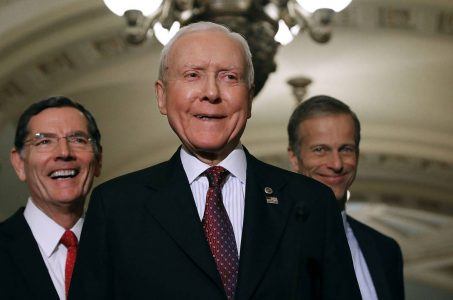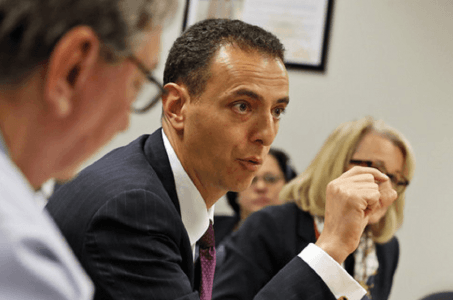New York Releases Sports Betting RFA, Seeks 50 Percent of Revenues (UPDATED)
Posted on: July 9, 2021, 03:11h.
Last updated on: July 10, 2021, 01:54h.
More than a week after it was supposed to be released, the New York State Gaming Commission on Friday posted the much-anticipated request for applications for mobile sports betting. And if operators want to set up shop in what would be the country’s most lucrative market, they’ll need to pony up to the state.

Based on the solicitation, New York is looking for operators that would be willing to share at least half of their gross gaming revenue with the state. That’s in addition to the $25 million platform providers will need to pay to get a license.
Under the plan approved by lawmakers when they passed the budget in April, the state will award at least two licenses to platform operators. Those platform operators will partner with at least two mobile sportsbooks, offering bettors at least four options with the possibility of more.
It is possible for two or more platform providers to be part of the same application.
According to the definition given to interested bidders by the Gaming Commission, a platform provider must deliver a system that accepts wagers, creates electronic receipts for wagers, determines the pool amount and payouts, maintain wagering records, and generates state-required reports.
Cuomo’s Vision for NY Sports Betting
The format outlined in the request for applications is a large part of the framework Gov. Andrew Cuomo proposed when he announced his support for mobile wagering statewide. Cuomo’s plan is unlike most other states that license mobile operators through established relationships with casinos or other stakeholders. The Governor wanted the state to run sports betting similar to the lottery, where one or more operators worked directly with the state and entered into revenue-sharing agreements.
New York has allowed retail sportsbooks at its full-fledged casinos, as well as tribal casinos, for two years. However, all of those venues are in upstate New York and too far away for New York City residents to utilize on a regular basis. As a result, Big Apple bettors either bet with an illegal bookie, use an unregulated offshore betting app, or take a short trip to New Jersey where online sports betting is allowed.
Cuomo previously had been wary of attempts by lawmakers to expand sports betting in the state. However, the COVID-19 pandemic brought about the possibility of multi-billion dollar deficits for the state. That prompted Cuomo to push for new revenue streams in the budget.
With nearly 20 million people in the state, New York would be by far the largest state to offer online sports betting. It’s likely it would trump neighboring New Jersey as the top sports betting market in the country.
Cuomo has estimated the state could get up to $500 million a year when the sports betting market matures.
Proposals Due in a Month
Initial applications must be submitted by 4 pm ET Aug. 9, according to the timeline posted in the solicitation.
Under the current time frame, finalists will be selected by the Gaming Commission no later than Dec. 6. Those finalists will have one week to submit their final applications.
The Gaming Commission said the licenses would be awarded at its subsequent meeting. It last met on June 29 and no other meeting dates have been set for this year.
State Sen. Joseph Addabbo (D-Queens), who chairs the Senate Committee on Racing, Gaming & Wagering and has pushed for mobile betting for years, has said he wants to see betting apps available by the Super Bowl next February.
The request-for-applications document was supposed to be released by July 1, according to the state budget. There was no explanation from the Gaming Commission for the delay.
How High Will They Go?
The Gaming Commission is required to award a license to each of the two platform operators. More licenses may be awarded, but only if the Commission believes the award or awards are in the best interest of the state and those providers agree to pay the same tax rate as the other awardees.
Similar to the New Hampshire Lottery’s solicitation in 2019, New York will let applicants propose the tax rate on gross gaming revenue. Based on the scoring matrix, aspiring platform providers that propose a 50 percent rate will earn 20 points toward their application’s score. In addition, the state will award a bonus point for each percentage point beyond 50 percent. So, if an applicant offers to give the state 53 percent, they would receive 23 points.
Applicants will also be scored on their technical application, which will look at the experience and capabilities of the platform provider and their participating operators. Platform integrity and security – which include ensuring bettors are located in the state, verifying bettor information, monitoring for suspicious betting activity, and IT security – will also be evaluated.
Other factors to be rated include applicant’s plans for promotions, ability to bring bettors onto their platform, and approach to promoting workforce diversity. Applicants that agree to a revenue-sharing plan with a New York-based tribal gaming entity will receive 5 bonus points.
Applicants that receive at least 60 points out of a possible 75 on the technical evaluation will be considered a “qualified applicant.” Those applicants may be called upon to give an oral presentation on or after Sept. 1.
Taxing Issues for New York Sports Betting
The state is putting a premium on offering a minimum 50 percent tax rate. In addition to receiving a high score for their pricing proposal, New York will offer those applicants a 10-year license.
However, the state’s insistence on such a steep rate likely means some interested sports betting companies will choose not to participate. As Sporrtrade CEO and Founder Alex Kane noted on Twitter Friday.
Unfortunately the proposed market structure in NY is one that favors bigger operators and undifferentiated products, and ultimately hurts the customer.
Why are those elected to represent the customer creating a market structure that hurts that customer? https://t.co/KbeO7T6hbR
— Alex Kane (@a_kane47) July 9, 2021
The tax rate has also raised concerns about whether the odds will be competitive with sportsbooks in other states. It’s an issue Addabbo raised after the governor first proposed the concept earlier this year.
However, “Captain” Jack Andrews, a noted sports bettor and vocal consumer advocate, tweeted Friday that a high rate shouldn’t impact lines. Neither should New York’s regulation that keeps platform providers from deducting promotional spending, such as deposit bonuses, from their tax liability.
Even if books can’t deduct their promo spend, the tax rate still won’t mean egregious lines, it’ll just mean fewer promos,” Andrews said.
Depending on the final award, New York stands to be either at the top or close it when it comes to the sports betting tax rate among states. According to the National Conference of State Legislatures, New Hampshire receives 51 percent of online sports betting revenue and 50 percent of retail revenue. Rhode Island also received 51 percent, while Delaware gets half. Montana and Oregon collect revenue from the lottery-managed sportsbooks minus expenses. Pennsylvania taxes sportsbook revenues at 36 percent.
New York taxes its retail sportsbooks at 10 percent, a figure more in line with other states where sports betting is legal.
Related News Articles
Most Popular
FTC: Casino Resort Fees Must Be Included in Upfront Hotel Rates
Genovese Capo Sentenced for Illegal Gambling on Long Island
NBA Referees Expose Sports Betting Abuse Following Steve Kerr Meltdown
UPDATE: Former Resorts World & MGM Grand Prez Loses Gaming License
Most Commented
-
UPDATE: Whiskey Pete’s Casino Near Las Vegas Closes
— December 20, 2024 — 30 Comments -
Caesars Virginia in Danville Now Accepting Hotel Room Reservations
— November 27, 2024 — 9 Comments -
UPDATE: Former Resorts World & MGM Grand Prez Loses Gaming License
— December 19, 2024 — 8 Comments -
FTC: Casino Resort Fees Must Be Included in Upfront Hotel Rates
— December 17, 2024 — 7 Comments
















Last Comment ( 1 )
Bonus buy slots are online slots where you can pay a premium in exchange for instant access to their main bonus feature; usually the free spins round. Also known as "feature buy"